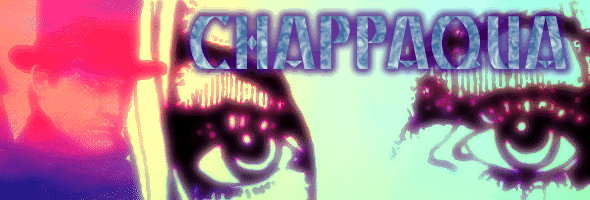
Color, 1966, 82 mins. Directed by Conrad Rooks
Starring Jean-Louis Barrault, Conrad Rooks, William S. Burroughs, Allen Ginsberg, Ravi Shankar, Swami Satchidananda, Moondog, Ornette Coleman / Music by Ravi Shankar and Philip Glass / Cinematography by Robert Frank
Format: DVD - Fox Lorber (MSRP $29.95)
Full Frame / Dolby Digital Mono
Apparently Rooks got a chunk of cash from dad and decided to make a film about his own drug treatments in Switzerland (relocated to France in the film). In the film, he relates his experiences and hallucinations to a doctor (Children of Paradise's Jean-Louis Barrault) as he undergoes a mysterious "sleep treatment." As far as autobiographical self-confessions go, this is about as sincere as John Wayne Bobbitt: Uncut, but '60s buffs will get a big kick out of seeing William S. Burroughs appear as Opium Jones, the head of the institute, and a quick cameo by Allen Ginsberg. While Rooks may not be a coherent filmmaker, at least he had the sense to hire the best talent he could find. Talented indie cinematographer Robert Frank (who also lensed the notorious Rolling Stones documentary Co*ksucker Blues) does some beautiful work here; the film alternates at random between color and black and white footage a la A Man and a Woman (most but not all of the color footage relates to Rooks' hallucinations), but Frank really shines during the haunting black and white sequences. Rooks' thespian skills really defy description, though it's unlikely someone would deliberately give such a bad performance. In any case, he does deliver some occasionally startling moments, such as his arrival at the clinic when he drops to the floor in front of a desk and suddenly finds the surface turned to ice -- and he hallucinates a man suddenly doing figure eights around him. Of course, his first appearance is memorable, too, at a New York acid party where the Fugs stomp on sugar cubes spelling out the letters "LSD" and an eye-rolling Rooks sprawls on the floor and licks up the residue. Rooks also provides some terrific mid-'60s footage of 42nd Street, and watching all of the trash theater marquees floating by provides a lot of fun ("Hey, it's Olga's White Slaves!"). Unfortunately, the good moments are seriously hampered by Rooks' bratty, self-indulgent ranting and some awfully stupid hallucinations (in one he's a vampire who attacks a woman at a party and winds up sprawling her on a table and covering her with fruit!). Clarity is definitely not the order of the day, but Rooks does manage to pull off a genuinely haunting final scene that almost makes the whole trip worthwhile (and probably explains how this won the Silver Lion at Cannes).
Chappaqua may be a series of magnificent, visionary images encasing a core of pure swill, but Fox Lorber's DVD is one of their best to date. The film was apparently shot on 16mm, but it looks exceptionally clear for its vintage with no noticeable digital artifacts. The percussive Ravi Shankar score (released on two separate albums with some spoken word performances by Burroughs) sounds fine, though a stereo mix would have been very effective (okay, wishful thinking, but...). The film's running time has been a subject of some dispute; apparently the press materials at Cannes promoted this as 92 minutes, though theatrical prints run 82 (as does the DVD). Other sources report cuts as short as 75 minutes which deleted the tame female nudity and other bits of potentially offensive material. Since Rooks himself supervised the transfer and owns the film, the current running time seems the most likely. The DVD also includes the video release promo clip (passed off as a trailer for some reason). Incidentally, Rooks' obvious obsession with other cultures probably inspired his second (and only other) film, a 1973 adaptation of Herman Hesse's Siddhartha that's long overdue for a video release.
Chappaqua, as our drug-addled protagonist Russell Harwick (Conrad Rooks) explains, is a small town in New York where he grew up in an innocent environment heavily populated with Indians. What this has to do with recovering from rampant alcoholism and drug abuse is anybody's guess, but it must mean something to Rooks, the son of the Avon Corporation's CEO and writing buddy of numerous famous members of the beat generation.
